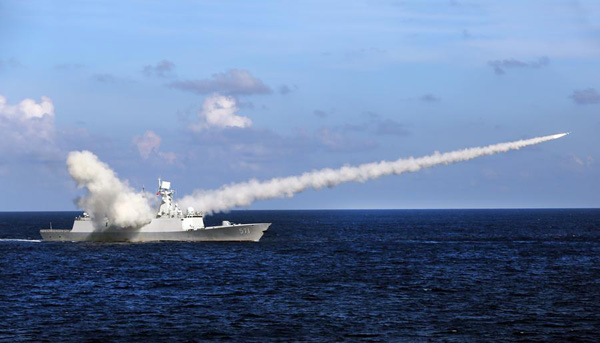Neighbors can manage their differences
Updated: 2016-07-25 08:00
By Zhang Junshe(China Daily)
|
|||||||||
The arbitration case initiated by the Philippines concerning the South China Sea is in essence about repudiating China's territorial rights and maritime interests in the waters, and putting a gloss on its illegal occupation of reefs and islets of China's Nansha Islands.
 |
|
Missile frigate Yuncheng launches an anti-ship missile during a military exercise in the water area near South China's Hainan Island and Xisha islands, July 8, 2016. [Photo/Xinhua] |
The recent award issued by the arbitral tribunal is fraught with procedural faults and unfounded "evidence", and thus makes no difference to China's stance of non-participation, non-acceptance, and non-recognition, as well as its legal presence in the South China Sea.
That China refuses to hold talks with any other country based on the illegitimate ruling is in line with international law and practices, which require all parties concerned to exercise restraint before their disputes are resolved.
In the case of their South China Sea dispute, the Philippines should work with China to shelve their disparities and peacefully co-develop the waters. Provisional cooperative arrangements do not contradict the maritime delimitation negotiations. As both were victims of colonial invasions by the West in the past and both are developing economies, they should focus on improving people's livelihoods, not confrontation.
Despite Beijing's efforts to alleviate tensions through negotiations and dialogues, former Philippine president Benigno Aquino III kept challenging China on the South China Sea and even unilaterally filed an arbitration case. Such a move not only violated relevant bilateral agreements and the Declaration on the Conduct of Parties in the South China Sea, but also overstepped the legal boundaries of the United Nations Convention on the Law of the Sea.
China and its littoral neighbors have both the wisdom and capability to manage their disagreements. More important, the South China Sea issues are only concerned with China and a few members of the Association of Southeast Asian Nations, not the bloc as a whole.
This year marks the 25th anniversary of China-ASEAN dialogue relations, which have borne fruit for both sides. Total bilateral trade was $472 billion in 2015, nearly 60 times the level in 1991, making them important trade partners and directly benefiting people on both sides.
ASEAN is still a regional priority in China's Belt and Road Initiative and free trade programs, and China will continue to strengthen bilateral coordination, especially maritime cooperation.
Related Stories
Jurisdiction of the tribunal questioned 2016-07-17 14:01
State Councilor's interview on the so-called award by the Arbitral Tribunal for South China Sea arbitration 2016-07-16 07:53
Forum questions Arbitral Tribunal's ruling over islands 2016-07-16 07:51
Cambodia not to back arbitral tribunal's upcoming decision over South China Sea: PM 2016-07-15 15:07
Tribunal acts as agent of external powers 2016-07-14 07:41
HK arbitration expert questions jurisdiction of tribunal in The Hague 2016-07-14 07:12
Today's Top News
French president urges Britain to begin EU exit talks
Turkey to restructure its army after coup attempt
UK to keep close economic ties with Germany: May
China's Fosun buys UK's Wolves for 45 million pounds
Rio 2016: Russia loses doping appeal
Brussels police: Bomb aleart was false alarm
May takes center stage in parliament's box-office show
Turkey's failed coup to consolidate Erdogan's power
Hot Topics
Lunar probe , China growth forecasts, Emission rules get tougher, China seen through 'colored lens', International board,
Editor's Picks

|

|

|

|

|

|







